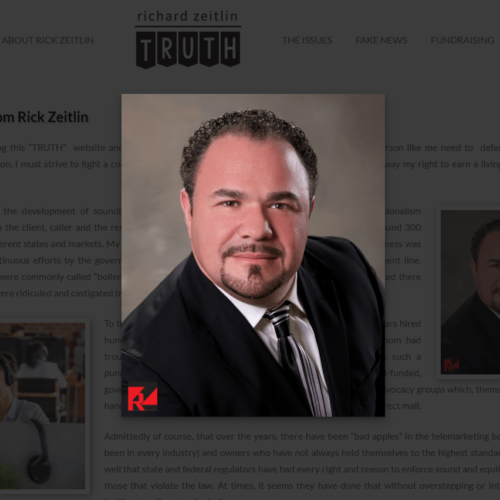The article is published in partnership with the Tampa Bay Times.
Introduction
A Nevada congresswoman called on federal authorities to investigate political action committees that raise funds for a cause — but plow most of what they raise back into their own paychecks and committee fundraising efforts.
The Justice Department should hold those who run such PACs “accountable to the fullest extent of the law,” and the Federal Election Commission should have increased authority to “punish bad actors,” said Rep. Dina Titus, D-Nev.
Titus is among several lawmakers who expressed concern about the findings of a Center for Public Integrity investigation that detailed the financial practices of a Las Vegas-based telemarketer and about three-dozen PACs and nonprofit charity organizations that contract with his companies.
Companies run by the telemarketer, Richard Zeitlin, together took in more than $133 million out of a combined $153.1 million raised since 2006 by PACs and charitable nonprofits that contract with his companies, according to reports the companies filed with the Colorado Secretary of State and the PACs filed with the Federal Election Commission.
Among Zeitlin’s clients is Las Vegas Metropolitan Police Department patrol officer William Pollock, whose four PACs raise money in the name of children with cancer, people with heart disease, police officers and firefighters. But Public Integrity reported last week that almost all of the money these PACs raise goes to Zeitlin’s companies and salaries for Pollock and his wife, Kecia Pollock.
Councilwoman Victoria Seaman, a member of the Las Vegas city council, wants officials in Clark County, Nevada, to investigate Pollock, who has not responded to Public Integrity’s requests for comment.
“Obviously, these kinds of allegations are of deep concern to the councilwoman, and she wants them to be thoroughly investigated and prosecuted, if warranted,” said David McGowan, Seaman’s chief of staff.
Las Vegas Mayor Pro Tem Michele Fiore echoed Seaman’s concerns in a statement from her office. She too, called for a “thorough investigation” and, if needed, prosecution.
The Las Vegas Metropolitan Police Department itself is “aware of the allegations” against William Pollock and is “looking into the matter,” according to statement from the department’s public information office.
To date, the Las Vegas Metropolitan Police Department’s citizen review board has not received any complaints about Pollock, said the board’s interim executive director, Julie Kraig.
At the federal level, members of Congress from both sides of the political spectrum agreed the federal government should be doing more to protect Americans from telemarketing calls that tug at heartstrings — but result in only a small percentage of money raised going toward the cause they’re advertising.
“It’s probably one of the biggest nuisances that is blowing across our country right now,” Rep. Brian Babin, R-Texas, said about telemarketing in general. “If you’ve got a telephone, you’re getting these calls. A lot of these calls are dangerous, and they’re disguised, especially to our elderly and people who would be subjected to scams.”
Babin said he himself receives numerous telemarketing calls each week, including one a few months ago when he was riding in a limousine with President Donald Trump.
The White House declined to comment on Public Integrity’s investigation.
Rep. John Sarbanes, D-Md., said Congress must strengthen federal agencies tasked to investigate nonprofits, political committees or their fundraisers — including the Federal Trade Commission, the Internal Revenue Service and the Federal Election Commission.
“If you take cops off the beat, if you dilute oversight, scrutiny, accountability and transparency, you’re asking for the wild wild West, and increasingly that seems to be the reality we’re living in,” Sarbanes said. “And it’s just completely unfair to the average citizen” who expects the federal government to protect consumers.
The FTC was investigating whether two of Zeitlin’s companies, Donor Relations and Courtesy Call, were “engaging in unfair or deceptive acts or practices,” according to a court document filed by the commission in February 2018.
But the companies did not cooperate, failing to meet deadlines and sending “patently inaccurate” documents, according to the FTC. The FTC suddenly dropped the investigation late last year, citing an ongoing grand jury investigation in southern Florida involving Courtesy Call and Donor Relations.
Joel Hansen, Zeitlin’s attorney, said neither Zeitlin nor his companies are a “target” of the grand jury investigation, and Zeitlin has fully cooperated with investigators. Hansen said he could not say anything else about the investigation.
Zeitlin, meanwhile, sued the FTC for changing policies related to telemarketing technology, a move he argues hurt his business. Zeitlin recently set up a website called “Richard Zeitlin Truth” that explains his frustrations.
“Common sense seems to be an uncommon quality among those at the FTC and their allies in the self-identified consumer advocacy community, which is why my industry peers and my employees and I are where we are: marginalized, harassed, threatened with extinction, unemployment and legal and perhaps criminal liability for perfecting a technology that solved every single legitimate complaint that plagued the industry and consuming public in the past,” Zeitlin wrote.
Several consumer advocates and government watchdogs say they support changes in laws that would require more transparency about how nonprofit and PAC money gets spent.
Craig Holman, government affairs lobbyist for Public Citizen, said the Federal Election Commission isn’t likely to crack down on how Zeitlin-connected PACs spend their money.
“In the political sphere, [Congress] would have to rewrite the federal campaign finance law that would allow the FEC to start monitoring how political committees are spending their money, and that’s kind of a tricky field,” Holman said.
As recently as December, the FEC formally asked Congress to “examine potentially fraudulent fundraising and spending activities of certain political committees” and “amend the Federal Election Campaign Act to address and prohibit fraudulent fundraising practices.” So far, Congress has not heeded the FEC’s request.
By shifting his business from charities to PACs, of late, Zeitlin has provided himself “a lot of extra protection” from lawsuits and government regulation, Holman said.
The FEC, which regulates PACs and enforces campaign finance laws, is fraught with infighting and low staff morale. A commissioner’s resignation on Sept. 1 caused the agency to lose a quorum, meaning it temporarily can’t enforce campaign finance laws.
“We’ve got no campaign finance cop on the beat, and this cop has historically decided that the government isn’t going to tell political committees” how to spend their money, Holman said.
Ellen Weintraub, the Democratic chairwoman of the FEC, did not respond to requests for comment.
Even if the FEC had more stability and resources, political committees have wide latitude to spend money as they want, and the FEC is limited to punishing scofflaws with civil enforcement actions that usually result in modest fines — when they result in fines at all.
For example, the FEC last week slapped Robert Piaro, who runs four PACs that contract with Zeitlin companies, with a $9,000 fine. Piaro’s PAC, Americans for the Cure of Breast Cancer, allegedly failed to disclose certain disbursements.
Fred Wertheimer, president of campaign finance reform group Democracy 21, said requiring PACs to disclose how much money on politics would provide donors with more information before they contribute to certain organizations.
While non-governmental organizations such as CharityWatch and Charity Navigator rate and review the finances charitable nonprofits, including some that contract with Zeitlin, there’s no similar organization that rates political committees’ finances.
“The PACs are off our radar screen,” said Daniel Borochoff, president and founder of CharityWatch, because there isn’t enough information available about how they spend their money.
Ultimately, consumers have to rely on themselves and watchdog organizations that evaluate charities, said Kevin Scally, chief relationship officer for Charity Navigator.
“It’s very easy to have your heartstrings pulled out and give to an organization that connects with you,” Scally said. But like consumers purchasing a new car or a pair of shoes, prospective donors to charities or PACs “should be doing the research.”
Read more in Money and Democracy
Coronavirus and Inequality
Trump’s drug cure for COVID-19 feels like déjà vu
Money and Democracy
They promise to help families of fallen officers. But they’re mostly paying telemarketers.
A union-backed police charity spends just a sliver of its money on those it purports to serve





Join the conversation
Show Comments